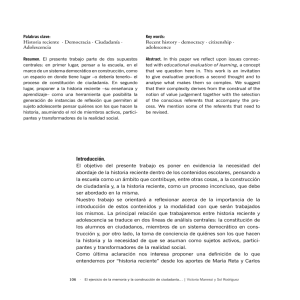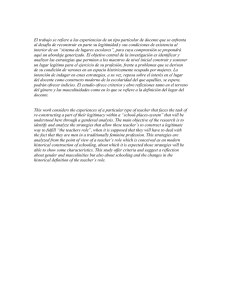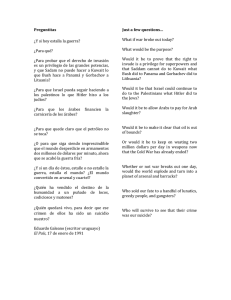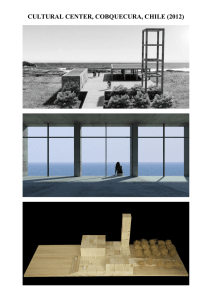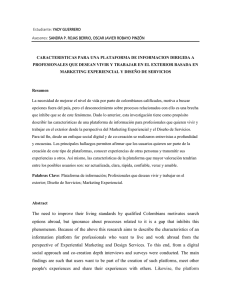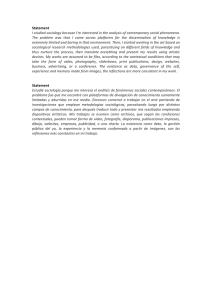(En españoll a continuación)
Anuncio
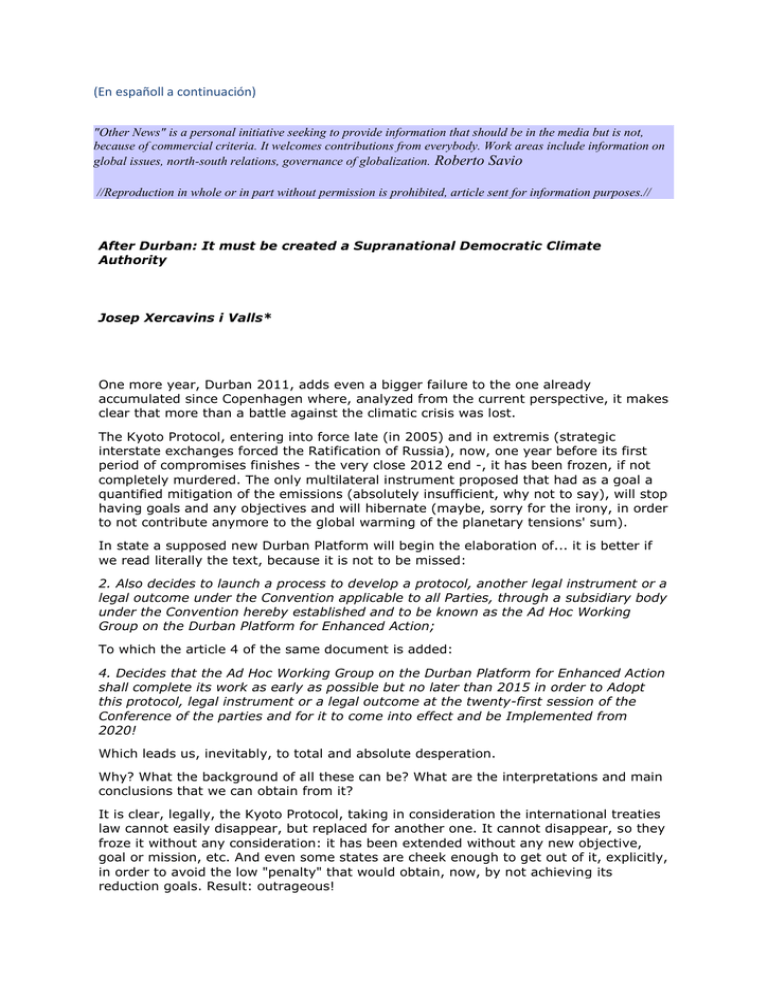
(En españoll a continuación) "Other News" is a personal initiative seeking to provide information that should be in the media but is not, because of commercial criteria. It welcomes contributions from everybody. Work areas include information on global issues, north-south relations, governance of globalization. Roberto Savio //Reproduction in whole or in part without permission is prohibited, article sent for information purposes.// After Durban: It must be created a Supranational Democratic Climate Authority Josep Xercavins i Valls* One more year, Durban 2011, adds even a bigger failure to the one already accumulated since Copenhagen where, analyzed from the current perspective, it makes clear that more than a battle against the climatic crisis was lost. The Kyoto Protocol, entering into force late (in 2005) and in extremis (strategic interstate exchanges forced the Ratification of Russia), now, one year before its first period of compromises finishes - the very close 2012 end -, it has been frozen, if not completely murdered. The only multilateral instrument proposed that had as a goal a quantified mitigation of the emissions (absolutely insufficient, why not to say), will stop having goals and any objectives and will hibernate (maybe, sorry for the irony, in order to not contribute anymore to the global warming of the planetary tensions' sum). In state a supposed new Durban Platform will begin the elaboration of... it is better if we read literally the text, because it is not to be missed: 2. Also decides to launch a process to develop a protocol, another legal instrument or a legal outcome under the Convention applicable to all Parties, through a subsidiary body under the Convention hereby established and to be known as the Ad Hoc Working Group on the Durban Platform for Enhanced Action; To which the article 4 of the same document is added: 4. Decides that the Ad Hoc Working Group on the Durban Platform for Enhanced Action shall complete its work as early as possible but no later than 2015 in order to Adopt this protocol, legal instrument or a legal outcome at the twenty-first session of the Conference of the parties and for it to come into effect and be Implemented from 2020! Which leads us, inevitably, to total and absolute desperation. Why? What the background of all these can be? What are the interpretations and main conclusions that we can obtain from it? It is clear, legally, the Kyoto Protocol, taking in consideration the international treaties law cannot easily disappear, but replaced for another one. It cannot disappear, so they froze it without any consideration: it has been extended without any new objective, goal or mission, etc. And even some states are cheek enough to get out of it, explicitly, in order to avoid the low "penalty" that would obtain, now, by not achieving its reduction goals. Result: outrageous! And frozen until when?, so until 2015, year that taking the article 4, just literally cited, from the Durban Platform a new one will be approved; because the calculations are a fact: the 21st COP (Conference of the Parties of the United Nations Framework Convention on Climate Change) will take place in 2015 (no more no less, and taking in consideration the previous experiences, it can be much more, isn't it?). And is it for sure that the result will be another treaty? The final negotiation, even represented as another business show, leads to a drawn up of article 2, also previously cited, from what we can obtain any strange thing (another legal instrument or one legal outcome) in which case the existence of similarities with a serious and rigorous international treaty would be only a "coincidence". But wait for it!: According to the article 4 from this Durban Platform, whatever that ends up being obtained in 2015 or in..., it will not enter into force before 2020. Then, if in order to ensure, according to the IPCC, that the average surface temperature in the earth would not increase more than 2 ◦ C more, it would have to and it has to be reduced, at least, by the developed countries, a reduction of from 20% to 40% of the emissions of 1990; so now nothing will be reduced, except of what a conscious and decent state would reduce by its own convictions. The 2 o 4 ◦ C more, are serves; and the fact that our grandsons will live in a planet very different of the current one is now for sure! And taking all these in consideration what should be done, what should be set out, what should be mobilize from the world citizens with historical conscience (past and above all future) of humanity? So bringing to the world a Worldwide Climate Democratic Governance System (and most important, supranational) that once analyzed the crisis based on the IPCC reports, and taking in consideration the different state situations and the Rio principles accepted by everybody in theory, takes, as a new Supranational Democratic Climate Authority, the mandatory decisions of mitigation and monitoring that each state of the world, depending of their levels of responsibility and capacities, should start achieving already, as soon as possible. Apart of the climate crisis we would be finally facing the main current problem of multilateralism: its inability of taking decision. Legitimate and even reasonable interests, analyzed from each country's perspective, are nowadays incompatible with the humanity interests as a whole that lives and would like to keep living in the earth planet that we know. Shouldn't we take advantage of the celebration of Rio +20 in order to begin all this? *Senior Lecturer in BarcelonaTech (Universidad Politècnica de Catalunya). President of the "project association World Democratic Governance, WDGpa": "Catalan aplicating Organization to the World Federalist Movement WFM" ________________________________________________________________ This and all "other news" issues can be found at http://www.other-net.info/index.php .................................................................................. 'Other news' es una iniciativa personal, que tiene el fin de proporcionar material que tendria que estar en los medios, y no esta por los criterios comerciales de la informacion. Esta abierta a recibir contribuciones de todos. Su area de trabajo es informar sobre temas globales, relaciones norte-sur, y gobernabilidad de la globalizacion. Roberto Savio //Reproducción prohibida, nota enviada a título informativo// Después de Durban: por una autoridad climática democrática supranacional Josep Xercavins i Valls* Un año más, Durban 2011, añade más fracaso al ya acumulado desde Copenhague donde, visto desde la perspectiva actual, queda claro que se perdió mucho más que una batalla contra la crisis climática. El Protocolo de Kioto, entrado en vigor tarde (en 2005) y en extremis (cambios de cromos entre estados que forzaron ese año la ratificación de Rusia), ahora, un año antes de terminar su primer período de compromisos - el muy próximo 2012 -, ha quedado congelado, por no decir asesinato del todo. El único instrumento multilateral que se proponía una mitigación cuantificada de emisiones (absolutamente insuficientes, dicho sea de paso) dejará de tener metas y objetivo alguno y entrará en estado de hibernación (quizás, perdón por la ironía, para no contribuir más de la cuenta al calentamiento global de los ánimos planetarios). En su lugar una supuesta nueva Plataforma de Durban emprenderá la elaboración de ... hay que leer el artículo textual porque no tiene desperdicio: 2. Also decides to launch a process to develop a protocol, another legal instrumento or a legal outcome under the Convention applicable to all Parties, through a subsidiary body under the Convention hereby established and to be known as the Ad Hoc Working Group on the Durban Platform for Enhanced Action; al que si se añade el artículo 4 del mismo documento: 4. Decides that the Ad Hoc Working Group on the Durban Platform for Enhanced Action shall complete its work as early as posible but no later than 2015 in order to Adopt this protocol, legal instrumento or a legal outcome at the twenty-first session of the Conference of the parties and for it to come into effect and be Implemented from 2020! nos lleva, irremediablemente, a la desesperación prácticamente total y absoluta. ¿Por qué? ¿Qué trasfondos puede tener todo ello? ¿Qué interpretaciones y conclusiones principales tenemos que sacar? Está claro que, legalmente, el Protocolo de Kioto, según el derecho de los tratados internacionales no puede desaparecer así como así, sino es sustituido por otro. No lo pueden hacer desaparecer, pues lo congelan sin más consideración ni miramientos: lo prorrogan sin ningún nuevo objetivo, meta, misión, etc. Y encima algún estado tiene la desfachatez de salirse del mismo, explícitamente, para evitar las pocas "penalizaciones" que le ocasionaría, ahora, su no cumplimiento. Total: ¡impresentable! ¿Y congelado hasta cuando?, pues hasta el 2015, año que según el artículo 4, acabado de citar textualmente, de la Plataforma de Durban será aprobado otro; porque las cuentas no engañan: la sesión 21 de la COP (Conferencia de las Partes de la Convención Marco de NNUU sobre el Cambio Climático) será el año 2015 (ni uno menos; en cambio, vista la experiencia, pueden ser mucho más, ¿verdad?). ¿Y seguro que será un nuevo tratado? La negociación final, incluso televisada como un nuevo show business más, lleva a un redactado del artículo 2, también acabado de citar textualmente, del que puede salir cualquier cosa extraña (another legal instrumento or one legal outcome) cuya semejanza con un tratado internacional serio y riguroso puede ser mera "coincidencia". Pero agarrémonos fuerte: de acuerdo con el artículo 4 de esta Plataforma de Durban, lo que sea que acabe siendo parido en 2015 o en el ..., no entrará en vigor antes del 2020. Es decir, si para asegurarnos, según el IPCC, que la temperatura media en la superficie de la tierra no aumente más de 2 ◦ C más, había y hay que realizar, como mínimo, una reducción de emisiones por parte de los países desarrollados de entre el 20 y el 40%, respecto a las emisiones de 1990, pues ahora no reduciremos nada, más allá que lo que algún estado consciente y digno quiera reducir por iniciativa propia. ¡Los 2 o 4 ◦ C más, están servidos; y que nuestros nietos vivirán en un planeta muy diferente del que nos encontramos nosotros es ya casi seguro! ¿Y ante esto que hay que hacer, que hay que plantear, que hay que movilizar desde la ciudadanía mundial con conciencia histórica (pasada y sobre todo futura) de humanidad? Pues dotar al mundo de un sistema de Gobernanza Democrático Climático Mundial (y sobre todo supranacional) que analizada la crisis a la luz de los informes del IPCC, y teniendo en cuenta las diferentes realidades estatales y los principios de Río asumidos en teoría para todos , tome, a modo de nueva autoridad climática democrática supranacional, las decisiones de mitigación obligatorias y monitorizables que cada estado del mundo, según sus diferentes niveles de responsabilidad y según sus diversas capacidades, tenga que empezar a cumplir ya, lo antes posible. Aparte de la crisis climática estaríamos afrontando finalmente el principal problema del actual multilateralismo: su incapacidad de tomar decisiones. Intereses legítimos e incluso razonables, mirados desde la perspectiva de cada uno de los estados, son hoy irreconciliables con los intereses del conjunto de la humanidad que vive y quiere seguir viviendo en el planeta tierra que conocemos. ¿Y no deberíamos aprovechar Río +20 para iniciar todo esto?. *Profesor Universidad Politècnica de Catalunya. Presidente de la "asociación proyecto Gobernanza Democrática Mundial, apGDM": "Organización Catalana Aplicando al Movimiento Federalista Mundial, MFM" _______________________________________ Este artículo y todos los otros envíos de "other news" están disponibles en http://www.other-news.info/noticias/
